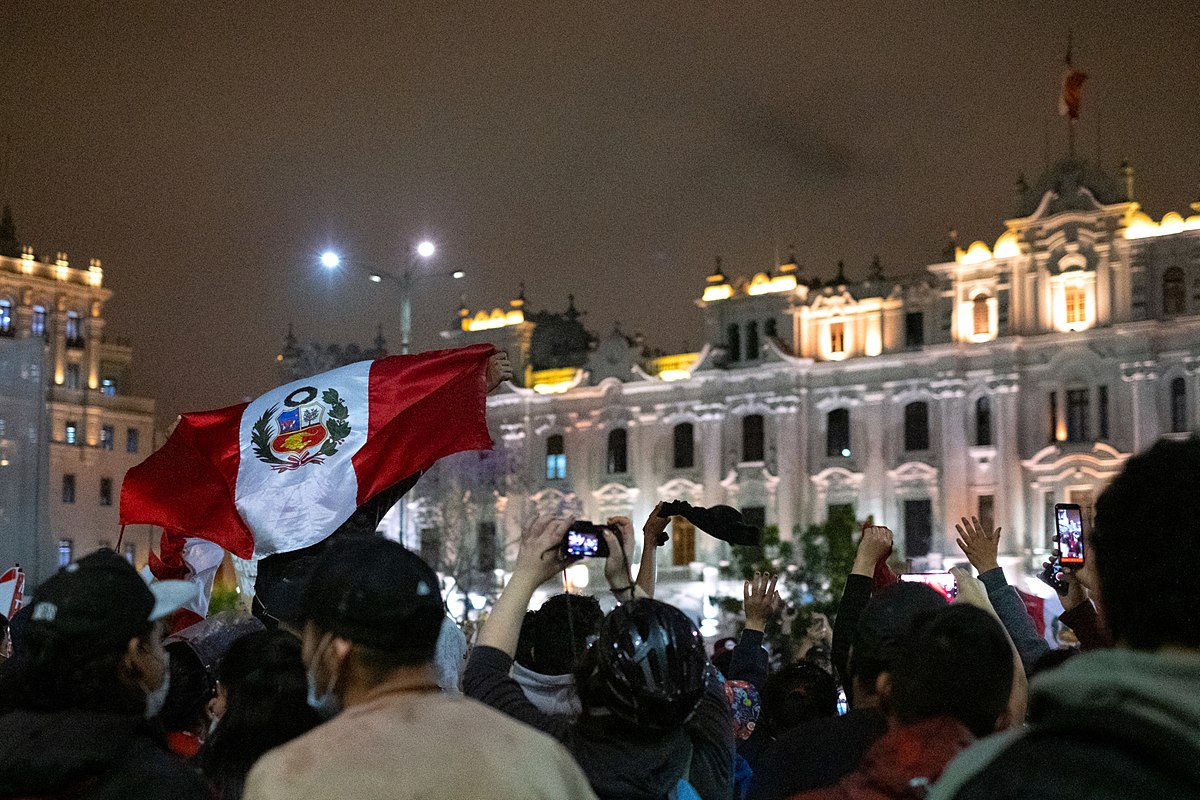
Demonstrations at Plaza San Martín, protesters carrying a large Peruvian flag. Photo: Samantha Hare.

Orinoco Tribune – News and opinion pieces about Venezuela and beyond
From Venezuela and made by Venezuelan Chavistas

Demonstrations at Plaza San Martín, protesters carrying a large Peruvian flag. Photo: Samantha Hare.
At least 20 people have died in Peru in this week due to police repression of protests calling for the release and reinstatement of President Pedro Castillo, who was ousted by Congress and replaced by Dina Boluarte.
According to media reports, six of the deaths occurred in Apurimac, one in Arequipa, three in La Libertad, one in Huancavelica, eight in Ayacucho, and one in Junín. The de facto president, Dina Boluarte declared curfew in 15 provinces of the country.
#Comunicado Demandamos cese inmediato de hechos de violencia en protestas sociales y pedimos a fuerzas armadas y policiales actuar conforme a la Constitución y la ley 👉🏾 https://t.co/zGOruuVMIr pic.twitter.com/xK1j1qBeyv
— Defensoría Perú (@Defensoria_Peru) December 16, 2022
The Ombudsperson of Peru, Eliana Revollar, called for an investigation into the circumstances of each of the deaths, since “in a state of emergency, the use of lethal weapons should be the last option.”
“A state of emergency does not suspend the right to life itself,” Revollar stated, referring to the preliminary versions of the deaths in Ayacucho, where the Armed Forces reportedly responded with lethal ammunition against the demonstrators who tried to take over the airport.
The Ombudsperson’s Office also issued a communiqué to demand the immediate cessation of the acts of violence and to exhort the security forces to act in accordance with the constitutional order.
“The police and military authorities must guarantee that the personnel under their charge have sufficient experience, training, and capacities to participate in the control of demonstrations without incurring abuses that put the life and integrity of the people at risk,” reads the communiqué, which also calls on the Peruvian State to make reparations to the families of the victims.
Political crisis
On Friday, December 16, the foreign minister of Peru, Ana Gervasi Díaz made a call to the protesters for dialogue while still defending the government’s repressive action. Meanwhile, mobilizations continue throughout the country, demanding the resignation of Boluarte, the dissolution of Congress, and the call for a Constituent Assembly.
“I lament the number of deaths and express our condolences to the bereaved,” Gervasi said. “This situation must not continue. Dialogue is required, but also firmness in the face of criminal actions,” branding as “firmness” the violent repression of protests by the security forces.
On Friday, the Peruvian Congress rejected the constitutional reform bill to bring forward elections to December 2023.
The initiative received 49 votes in favor, 33 against, and 25 abstentions in the plenary of the parliament, thus failing to achieve the required two-thirds in Congress.
Meanwhile, the minister of culture, Jair Perez Brañez, and the minister of education, Patricia Correa, both from the de facto government led by Dina Boluarte, made public their resignation after the deadly toll caused by the repression of protests by the police and armed forces.
“Today I have presented my irrevocable resignation,” Pérez Brañez wrote on Twitter. “Peru needs peace and effective dialogue; and no more violence wherever it comes from. I call on the highest level and all powers to reflect and take action to bring peace to the Peruvian people. Not one more death.”
For her part, the now ex-minister for education wrote the following on her social media account: “The death of compatriots has no justification. State violence cannot be disproportionate and cause death,” attaching the letter sent to Boluarte, in which she informed her of her “irrevocable resignation” from office.
(RT) with Orinoco Tribune content
Translation: Orinoco Tribune
OT/RQ/SC